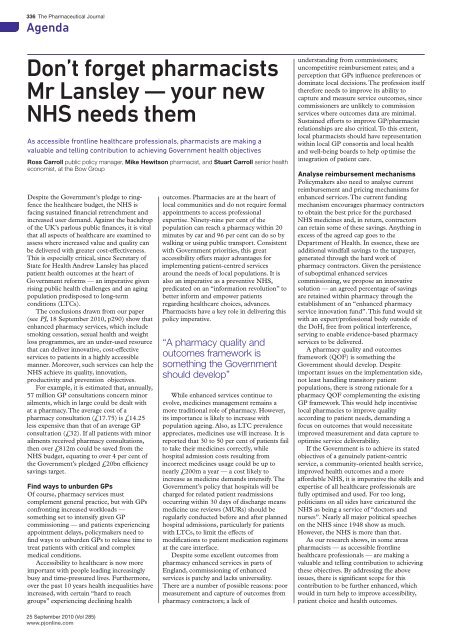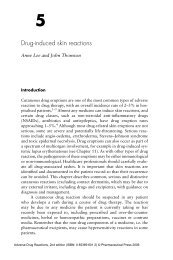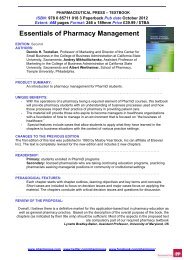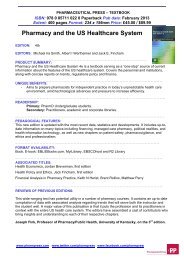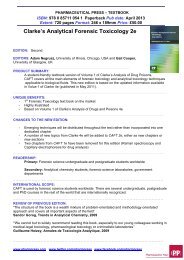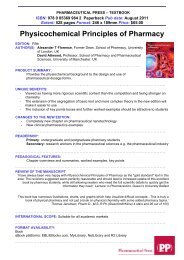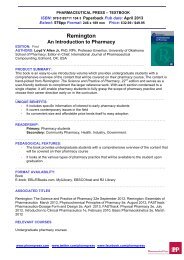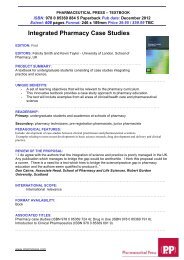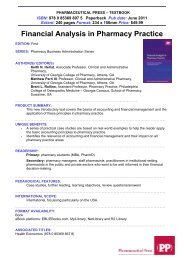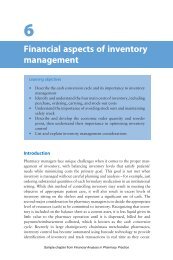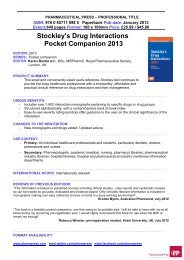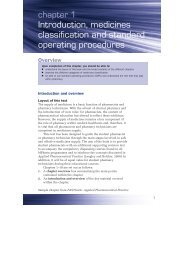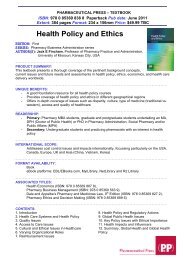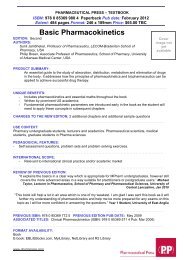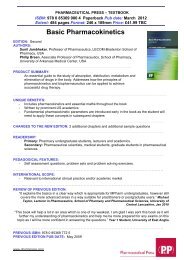How to deal with military prescriptions - Pharmaceutical Press
How to deal with military prescriptions - Pharmaceutical Press
How to deal with military prescriptions - Pharmaceutical Press
Create successful ePaper yourself
Turn your PDF publications into a flip-book with our unique Google optimized e-Paper software.
336 The <strong>Pharmaceutical</strong> Journal<br />
Agenda<br />
Don’t forget pharmacists<br />
Mr Lansley — your new<br />
NHS needs them<br />
As accessible frontline healthcare professionals, pharmacists are making a<br />
valuable and telling contribution <strong>to</strong> achieving Government health objectives<br />
Ross Carroll public policy manager, Mike Hewitson pharmacist, and Stuart Carroll senior health<br />
economist, at the Bow Group<br />
Despite the Government’s pledge <strong>to</strong> ringfence<br />
the healthcare budget, the NHS is<br />
facing sustained financial retrenchment and<br />
increased user demand. Against the backdrop<br />
of the UK’s parlous public finances, it is vital<br />
that all aspects of healthcare are examined <strong>to</strong><br />
assess where increased value and quality can<br />
be delivered <strong>with</strong> greater cost-effectiveness.<br />
This is especially critical, since Secretary of<br />
State for Health Andrew Lansley has placed<br />
patient health outcomes at the heart of<br />
Government reforms — an imperative given<br />
rising public health challenges and an aging<br />
population predisposed <strong>to</strong> long-term<br />
conditions (LTCs).<br />
The conclusions drawn from our paper<br />
(see PJ, 18 September 2010, p290) show that<br />
enhanced pharmacy services, which include<br />
smoking cessation, sexual health and weight<br />
loss programmes, are an under-used resource<br />
that can deliver innovative, cost-effective<br />
services <strong>to</strong> patients in a highly accessible<br />
manner. Moreover, such services can help the<br />
NHS achieve its quality, innovation,<br />
productivity and prevention objectives.<br />
For example, it is estimated that, annually,<br />
57 million GP consultations concern minor<br />
ailments, which in large could be <strong>deal</strong>t <strong>with</strong><br />
at a pharmacy. The average cost of a<br />
pharmacy consultation (£17.75) is £14.25<br />
less expensive than that of an average GP<br />
consultation (£32). If all patients <strong>with</strong> minor<br />
ailments received pharmacy consultations,<br />
then over £812m could be saved from the<br />
NHS budget, equating <strong>to</strong> over 4 per cent of<br />
the Government’s pledged £20bn efficiency<br />
savings target.<br />
Find ways <strong>to</strong> unburden GPs<br />
Of course, pharmacy services must<br />
complement general practice, but <strong>with</strong> GPs<br />
confronting increased workloads —<br />
something set <strong>to</strong> intensify given GP<br />
commissioning — and patients experiencing<br />
appointment delays, policymakers need <strong>to</strong><br />
find ways <strong>to</strong> unburden GPs <strong>to</strong> release time <strong>to</strong><br />
treat patients <strong>with</strong> critical and complex<br />
medical conditions.<br />
Accessibility <strong>to</strong> healthcare is now more<br />
important <strong>with</strong> people leading increasingly<br />
busy and time-pressured lives. Furthermore,<br />
over the past 10 years health inequalities have<br />
increased, <strong>with</strong> certain “hard <strong>to</strong> reach<br />
groups” experiencing declining health<br />
outcomes. Pharmacies are at the heart of<br />
local communities and do not require formal<br />
appointments <strong>to</strong> access professional<br />
expertise. Ninety-nine per cent of the<br />
population can reach a pharmacy <strong>with</strong>in 20<br />
minutes by car and 96 per cent can do so by<br />
walking or using public transport. Consistent<br />
<strong>with</strong> Government priorities, this great<br />
accessibility offers major advantages for<br />
implementing patient-centred services<br />
around the needs of local populations. It is<br />
also an imperative as a preventive NHS,<br />
predicated on an “information revolution” <strong>to</strong><br />
better inform and empower patients<br />
regarding healthcare choices, advances.<br />
Pharmacists have a key role in delivering this<br />
policy imperative.<br />
“A pharmacy quality and<br />
outcomes framework is<br />
something the Government<br />
should develop”<br />
While enhanced services continue <strong>to</strong><br />
evolve, medicines management remains a<br />
more traditional role of pharmacy. <strong>How</strong>ever,<br />
its importance is likely <strong>to</strong> increase <strong>with</strong><br />
population ageing. Also, as LTC prevalence<br />
appreciates, medicines use will increase. It is<br />
reported that 30 <strong>to</strong> 50 per cent of patients fail<br />
<strong>to</strong> take their medicines correctly, while<br />
hospital admission costs resulting from<br />
incorrect medicines usage could be up <strong>to</strong><br />
nearly £200m a year — a cost likely <strong>to</strong><br />
increase as medicine demands intensify. The<br />
Government’s policy that hospitals will be<br />
charged for related patient readmissions<br />
occurring <strong>with</strong>in 30 days of discharge means<br />
medicine use reviews (MURs) should be<br />
regularly conducted before and after planned<br />
hospital admissions, particularly for patients<br />
<strong>with</strong> LTCs, <strong>to</strong> limit the effects of<br />
modifications <strong>to</strong> patient medication regimens<br />
at the care interface.<br />
Despite some excellent outcomes from<br />
pharmacy enhanced services in parts of<br />
England, commissioning of enhanced<br />
services is patchy and lacks universality.<br />
There are a number of possible reasons: poor<br />
measurement and capture of outcomes from<br />
pharmacy contrac<strong>to</strong>rs; a lack of<br />
understanding from commissioners;<br />
uncompetitive reimbursement rates; and a<br />
perception that GPs influence preferences or<br />
dominate local decisions. The profession itself<br />
therefore needs <strong>to</strong> improve its ability <strong>to</strong><br />
capture and measure service outcomes, since<br />
commissioners are unlikely <strong>to</strong> commission<br />
services where outcomes data are minimal.<br />
Sustained efforts <strong>to</strong> improve GP/pharmacist<br />
relationships are also critical. To this extent,<br />
local pharmacists should have representation<br />
<strong>with</strong>in local GP consortia and local health<br />
and well-being boards <strong>to</strong> help optimise the<br />
integration of patient care.<br />
Analyse reimbursement mechanisms<br />
Policymakers also need <strong>to</strong> analyse current<br />
reimbursement and pricing mechanisms for<br />
enhanced services. The current funding<br />
mechanism encourages pharmacy contrac<strong>to</strong>rs<br />
<strong>to</strong> obtain the best price for the purchased<br />
NHS medicines and, in return, contrac<strong>to</strong>rs<br />
can retain some of these savings. Anything in<br />
excess of the agreed cap goes <strong>to</strong> the<br />
Department of Health. In essence, these are<br />
additional windfall savings <strong>to</strong> the taxpayer,<br />
generated through the hard work of<br />
pharmacy contrac<strong>to</strong>rs. Given the persistence<br />
of suboptimal enhanced services<br />
commissioning, we propose an innovative<br />
solution — an agreed percentage of savings<br />
are retained <strong>with</strong>in pharmacy through the<br />
establishment of an “enhanced pharmacy<br />
service innovation fund”. This fund would sit<br />
<strong>with</strong> an expert/professional body outside of<br />
the DoH, free from political interference,<br />
serving <strong>to</strong> enable evidence-based pharmacy<br />
services <strong>to</strong> be delivered.<br />
A pharmacy quality and outcomes<br />
framework (QOF) is something the<br />
Government should develop. Despite<br />
important issues on the implementation side,<br />
not least handling transi<strong>to</strong>ry patient<br />
populations, there is strong rationale for a<br />
pharmacy QOF complementing the existing<br />
GP framework. This would help incentivise<br />
local pharmacies <strong>to</strong> improve quality<br />
according <strong>to</strong> patient needs, demanding a<br />
focus on outcomes that would necessitate<br />
improved measurement and data capture <strong>to</strong><br />
optimise service deliverability.<br />
If the Government is <strong>to</strong> achieve its stated<br />
objectives of a genuinely patient-centric<br />
service, a community-oriented health service,<br />
improved health outcomes and a more<br />
affordable NHS, it is imperative the skills and<br />
expertise of all healthcare professionals are<br />
fully optimised and used. For <strong>to</strong>o long,<br />
politicians on all sides have caricatured the<br />
NHS as being a service of “doc<strong>to</strong>rs and<br />
nurses”. Nearly all major political speeches<br />
on the NHS since 1948 show as much.<br />
<strong>How</strong>ever, the NHS is more than that.<br />
As our research shows, in some areas<br />
pharmacists — as accessible frontline<br />
healthcare professionals — are making a<br />
valuable and telling contribution <strong>to</strong> achieving<br />
these objectives. By addressing the above<br />
issues, there is significant scope for this<br />
contribution <strong>to</strong> be further enhanced, which<br />
would in turn help <strong>to</strong> improve accessibility,<br />
patient choice and health outcomes.<br />
25 September 2010 (Vol 285)<br />
www.pjonline.com


